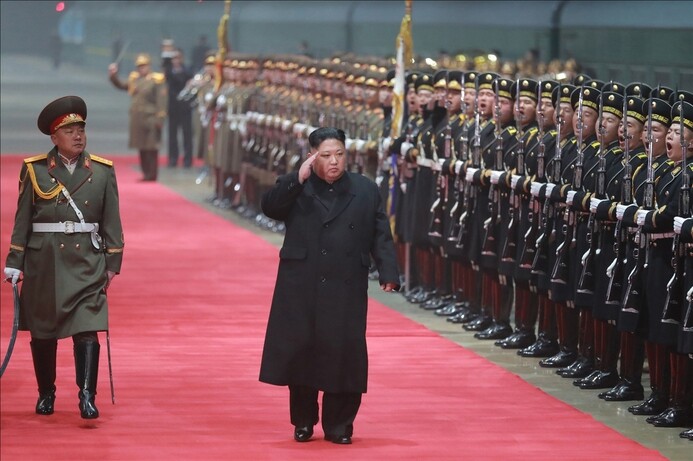hankyoreh
Links to other country sites 다른 나라 사이트 링크
[Editorial] South Korea needs to meditation plan that will satisfy both North Korea and US

North Korean leader Kim Jong-un arrived in Pyongyang early in the morning of Mar. 5 after a train journey of 11 days. The disappointment over the failure to reach an agreement with the US in the Hanoi summit was evident in the terse description given by the Rodong Sinmun newspaper in its report on Kim’s return, which described the summit as “productive.” It reads as evidence of just how high the North’s hopes for this summit were.
But despite the lack of an agreement, the window of opportunity is still open, and it’s too early to despair. On Mar. 4, US Secretary of State reaffirmed his willingness to resume talks, announcing that he wanted to send a negotiating team to Pyongyang “in the next couple weeks.” We look forward to both sides getting back to negotiating after taking some time to deal with the aftereffects from the talks’ collapse.
It’s time now for the South Korean government to take proactive steps as a mediator in the North Korea-US negotiations. That was most likely the message President Moon Jae-in wanted to send when he declared South Korea’s role to have “become crucial once again” and instructed the relevant ministries to “accurately assess the differences in position between North Korea and the US and come up with ideas for bridging the gap” during a National Security Council (NSC) meeting on Mar. 4. After stressing that the immediate order of business was to “prevent North Korea-US dialogue from derailing,” he went on to emphasize Seoul’s catalyzing role, calling for efforts to allow “the swift resumption of North Korea-US working-level dialogue so that the deadlock does not go on too long.”
The situation is not great. The outcome of the Hanoi summit shows clearly just how big the divide is between Pyongyang and Washington. North Korea wanted UN sanctions on livelihood-related areas lifted in exchange for permanently dismantling its nuclear facilities at Yongbyon; while the US reportedly demanded the dismantlement of the North’s ballistic missiles and biological and chemical weapons in addition to Yongbyon and all other nuclear facilities and weapons. The gap appears too large to permit an easy compromise.
But for a Korean Peninsula that has already experienced all the horrors of war, there is no other way out besides resolving issues through dialogue and negotiation. The South Korean government needs to reflect accurately on the full situation with the North Korea-US talks, drawing upon all its channels with both sides to figure out what the problem is and what each side really wants in order to produce a mediation plan that can satisfy both. Pyongyang and Washington, for their part, each need to give more serious consideration to their counterpart’s demands and concerns. North Korea should listen to the US when it says it wants something more than the dismantlement of Yongbyon. And if the US is demanding “complete denuclearization,” it needs to consider realistic ways of allaying Pyongyang’s concerns about subsequent security guarantees.
Please direct comments or questions to [english@hani.co.kr]

Editorial・opinion
![[Editorial] Penalties for airing allegations against Korea’s first lady endanger free press [Editorial] Penalties for airing allegations against Korea’s first lady endanger free press](https://flexible.img.hani.co.kr/flexible/normal/500/300/imgdb/original/2024/0502/1817146398095106.jpg) [Editorial] Penalties for airing allegations against Korea’s first lady endanger free press
[Editorial] Penalties for airing allegations against Korea’s first lady endanger free press![[Editorial] Yoon must halt procurement of SM-3 interceptor missiles [Editorial] Yoon must halt procurement of SM-3 interceptor missiles](https://flexible.img.hani.co.kr/flexible/normal/500/300/imgdb/child/2024/0501/17145495551605_1717145495195344.jpg) [Editorial] Yoon must halt procurement of SM-3 interceptor missiles
[Editorial] Yoon must halt procurement of SM-3 interceptor missiles- [Guest essay] Maybe Korea’s rapid population decline is an opportunity, not a crisis
- [Column] Can Yoon steer diplomacy with Russia, China back on track?
- [Column] Season 2 of special prosecutor probe may be coming to Korea soon
- [Column] Park Geun-hye déjà vu in Yoon Suk-yeol
- [Editorial] New weight of N. Korea’s nuclear threats makes dialogue all the more urgent
- [Guest essay] The real reason Korea’s new right wants to dub Rhee a founding father
- [Column] ‘Choson’: Is it time we start referring to N. Korea in its own terms?
- [Editorial] Japan’s rewriting of history with Korea has gone too far
Most viewed articles
- 160% of young Koreans see no need to have kids after marriage
- 2Presidential office warns of veto in response to opposition passing special counsel probe act
- 3Hybe-Ador dispute shines light on pervasive issues behind K-pop’s tidy facade
- 4Months and months of overdue wages are pushing migrant workers in Korea into debt
- 5[Editorial] Penalties for airing allegations against Korea’s first lady endanger free press
- 6Japan says it’s not pressuring Naver to sell Line, but Korean insiders say otherwise
- 7OECD upgrades Korea’s growth forecast from 2.2% to 2.6%
- 8Bills for Itaewon crush inquiry, special counsel probe into Marine’s death pass National Assembly
- 9[Guest essay] Maybe Korea’s rapid population decline is an opportunity, not a crisis
- 10[Reporter’s notebook] In Min’s world, she’s the artist — and NewJeans is her art